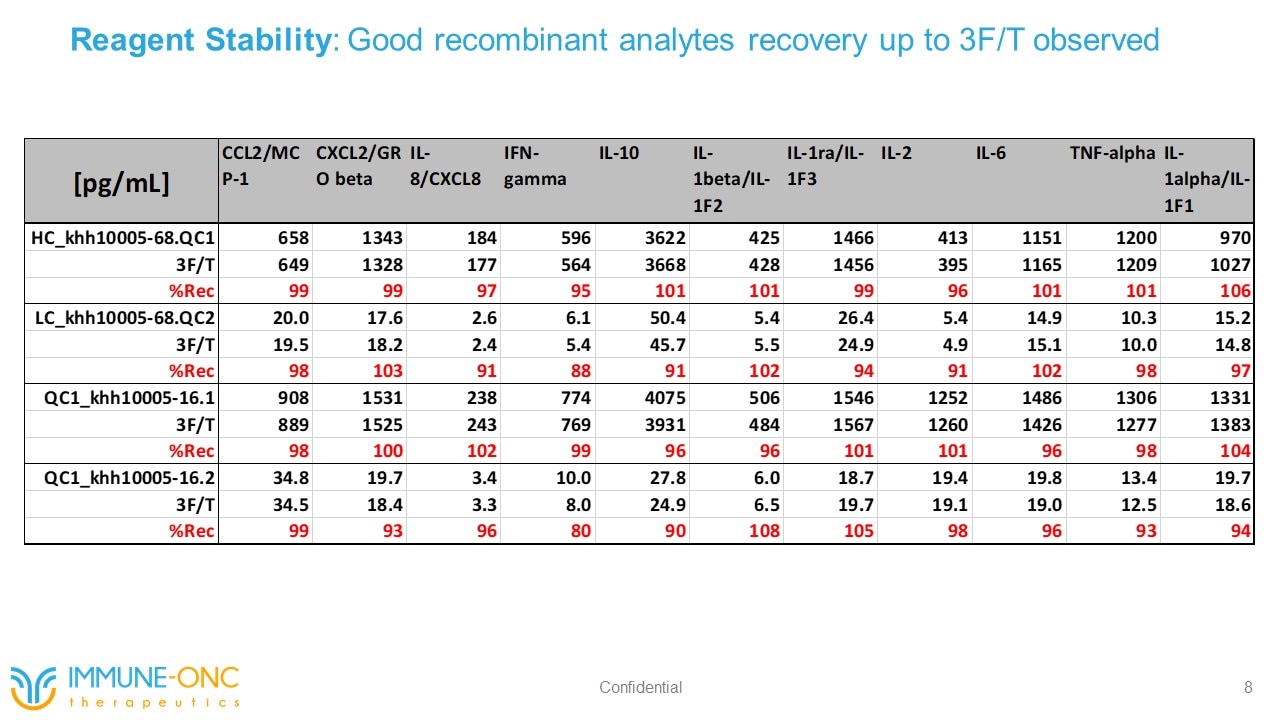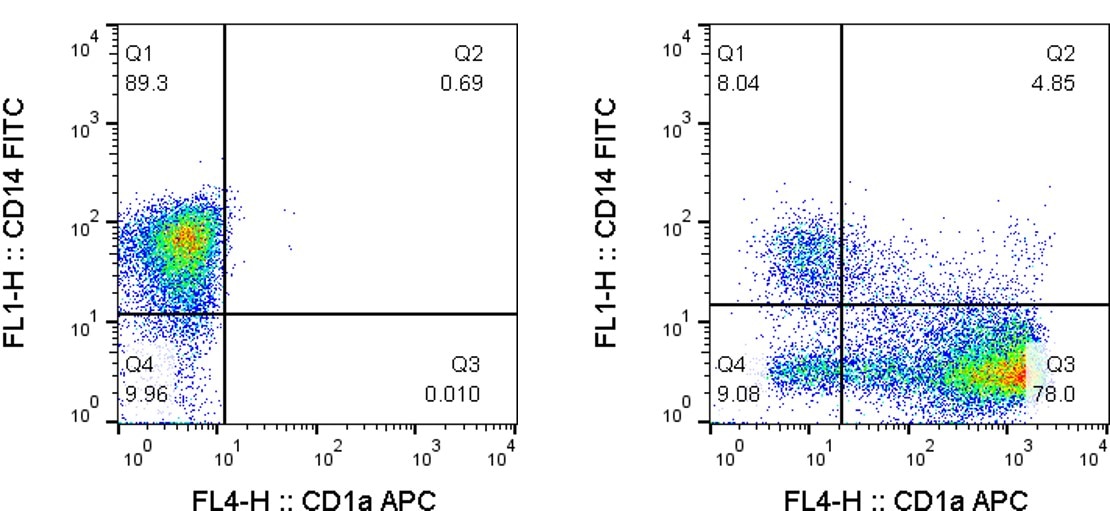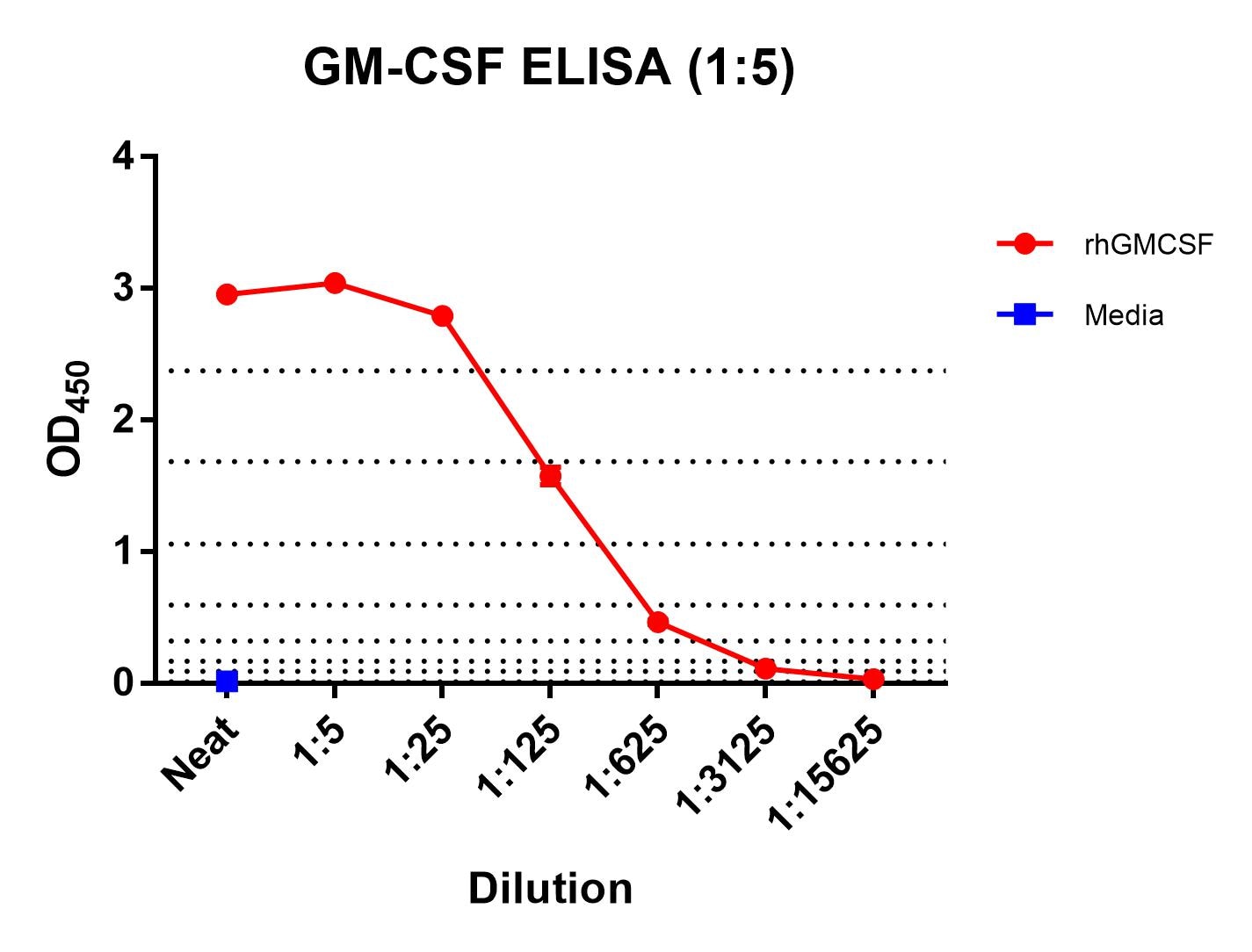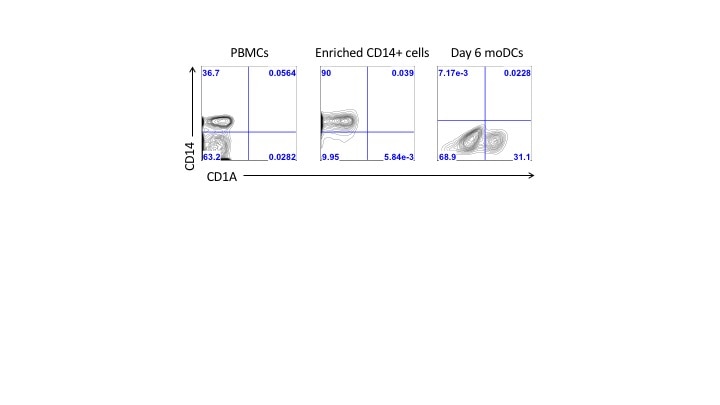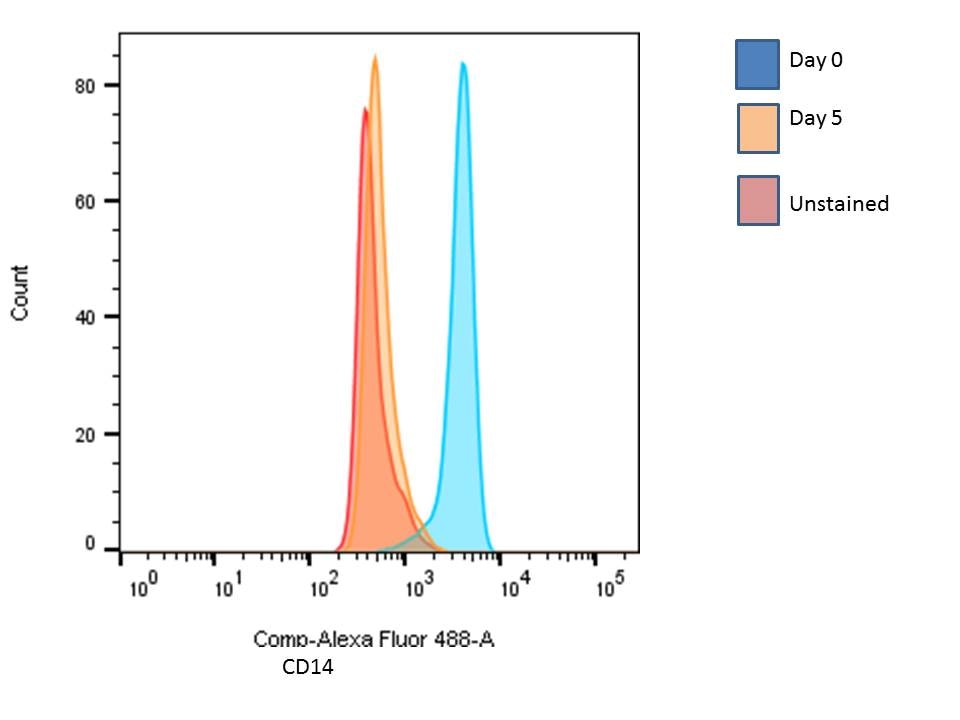Recombinant Human GM-CSF (CHO-expressed) Protein
Recombinant Human GM-CSF (CHO-expressed) Protein Summary
Product Specifications
Ala18-Glu144
Analysis
Product Datasheets
Carrier Free
CF stands for Carrier Free (CF). We typically add Bovine Serum Albumin (BSA) as a carrier protein to our recombinant proteins. Adding a carrier protein enhances protein stability, increases shelf-life, and allows the recombinant protein to be stored at a more dilute concentration. The carrier free version does not contain BSA.
In general, we advise purchasing the recombinant protein with BSA for use in cell or tissue culture, or as an ELISA standard. In contrast, the carrier free protein is recommended for applications, in which the presence of BSA could interfere.
7954-GM
| Formulation | Lyophilized from a 0.2 μm filtered solution in PBS with BSA as a carrier protein. |
| Reconstitution | Reconstitute at 100 μg/mL in PBS containing at least 0.1% human or bovine serum albumin. |
| Shipping | The product is shipped at ambient temperature. Upon receipt, store it immediately at the temperature recommended below. |
| Stability & Storage: | Use a manual defrost freezer and avoid repeated freeze-thaw cycles.
|
7954-GM/CF
| Formulation | Lyophilized from a 0.2 μm filtered solution in PBS. |
| Reconstitution | Reconstitute at 100 μg/mL in PBS. |
| Shipping | The product is shipped at ambient temperature. Upon receipt, store it immediately at the temperature recommended below. |
| Stability & Storage: | Use a manual defrost freezer and avoid repeated freeze-thaw cycles.
|
Scientific Data
 View Larger
View Larger
Recombinant Human GM-CSF (Catalog # 7954-GM) has a molecular weight (MW) of 16.3 kDa as analyzed by SEC-MALS, suggesting that this protein is a monomer. MW may differ from predicted MW due to post-translational modifications (PTMs) present (i.e. Glycosylation).
 View Larger
View Larger
Measured in a cell proliferation assay using TF-1 human erythroleukemic cells. The ED50 for this effect is 6-30 pg/mL.
Reconstitution Calculator
Background: GM-CSF
GM‑CSF was initially characterized as a factor that can support the in vitro colony formation of granulocyte‑macrophage progenitors. It is also a growth factor for erythroid, megakaryocyte, and eosinophil progenitors. GM‑CSF is produced by a number of different cell types (including T cells, B cells, macrophages, mast cells, endothelial cells, fibroblasts, and adipocytes) in response to cytokine or inflammatory stimuli. On mature hematopoietic cells, GM‑CSF is a survival factor for and activates the effector functions of granulocytes, monocytes/macrophages, and eosinophils (1, 2). GM‑CSF promotes a Th1 biased immune response, angiogenesis, allergic inflammation, and the development of autoimmunity (3‑5). It shows clinical effectiveness in ameliorating chemotherapy‑induced neutropenia, and GM‑CSF transfected tumor cells are utilized as cancer vaccines (6, 7). The 22 kDa glycosylated GM‑CSF, similar to IL‑3 and IL‑5, is a cytokine with a core of four bundled alpha ‑helices (8‑12). Mature human GM‑CSF shares 63%‑70% amino acid sequence identity with canine, feline, porcine, and rat GM‑CSF and 54% with mouse GM‑CSF. GM‑CSF exerts its biological effects through a heterodimeric receptor complex composed of GM‑CSF R alpha /CD116 and the signal transducing common beta chain (CD131) which is also a component of the high‑affinity receptors for IL‑3 and IL‑5 (13, 14). In addition, GM‑CSF binds a naturally occurring soluble form of GM‑CSF R alpha (15). Human GM‑CSF is active on canine and feline cells but not on murine cells (16‑18).
- Martinez-Moczygemba, M. and D.P. Huston (2003) J. Allergy Clin. Immunol. 112:653.
- Barreda, D.R. et al. (2004) Dev. Comp. Immunol. 28:509.
- Eksioglu, E.A. et al. (2007) Exp. Hematol. 35:1163.
- Cao, Y. (2007) J. Clin. Invest. 117:2362.
- Fleetwood, A.J. et al. (2005) Crit. Rev. Immunol. 25:405.
- Heuser, M. et al. (2007) Semin. Hematol. 44:148.
- Hege, K.M. et al. (2006) Int. Rev. Immunol. 25:321.
- Kaushansky, K. et al. (1992) Biochemistry 31:1881.
- Diederichs, K. et al. (1991) Science 254:1779.
- Cantrell, M.A. et al. (1985) Proc. Natl. Acad. Sci. 82:6250.
- Lee, F. et al. (1985) Proc. Natl. Acad. Sci. 82:4360.
- Wong, G.G. et al. (1985) Science 228:810.
- Onetto-Pothier, N. et al. (1990) Blood 75:59.
- Hayashida, K. et al. (1990) Proc. Natl. Acad. Sci. 87:9655.
- Pelley, J.L. et al. (2007) Exp. Hematol. 35:1483.
- Hogge, G.S. et al. (1990) Cancer Gene Ther. 6:26.
- Sprague, W.S. et al. (2005) J. Comp. Pathol. 133:136.
- Shanafelt, A.B. et al. (1991) J. Biol. Chem. 266:13804.
Citations for Recombinant Human GM-CSF (CHO-expressed) Protein
R&D Systems personnel manually curate a database that contains references using R&D Systems products. The data collected includes not only links to publications in PubMed, but also provides information about sample types, species, and experimental conditions.
7
Citations: Showing 1 - 7
Filter your results:
Filter by:
-
Single cell analysis reveals an antiviral network that controls Zika virus infection in human dendritic cells
Authors: Moore, KM;Pelletier, AN;Lapp, S;Metz, A;Tharp, GK;Lee, M;Bhasin, SS;Bhasin, M;Sékaly, RP;Bosinger, SE;Suthar, MS;
bioRxiv : the preprint server for biology
Species: Human
Sample Types: Whole Cells
Applications: Bioassay -
Tumor cell-intrinsic PD-1 promotes Merkel cell carcinoma growth by activating downstream mTOR-mitochondrial ROS signaling
Authors: Martins, C;Rasbach, E;Heppt, MV;Singh, P;Kulcsar, Z;Holzgruber, J;Chakraborty, A;Mucciarone, K;Kleffel, S;Brandenburg, A;Hoetzenecker, W;Rahbari, NN;DeCaprio, JA;Thakuria, M;Murphy, GF;Ramsey, MR;Posch, C;Barthel, SR;Schatton, T;
Science advances
Species: Human
Sample Types: Whole Cells
Applications: Bioassay -
TIM-3 Expression and M2 Polarization of Macrophages in the TGF?-Activated Tumor Microenvironment in Colorectal Cancer
Authors: Katagata, M;Okayama, H;Nakajima, S;Saito, K;Sato, T;Sakuma, M;Fukai, S;Endo, E;Sakamoto, W;Saito, M;Saze, Z;Momma, T;Mimura, K;Kono, K;
Cancers
Species: Human
Sample Types: Whole Cells
Applications: Cell Culture -
Enhanced powder dispersion of dual-excipient spray-dried powder formulations of a monoclonal antibody and its fragment for local treatment of severe asthma
Authors: Pan, HW;Guo, J;Zhu, L;Leung, SWS;Zhang, C;Lam, JKW;
International journal of pharmaceutics
Species: Human
Sample Types: Whole Cells
Applications: Bioassay -
Transient regulation of RNA methylation in human hematopoietic stem cells promotes their homing and engraftment
Authors: X Wang, S Cooper, HE Broxmeyer, R Kapur
Leukemia, 2022-12-02;0(0):.
Species: Human
Sample Types: Whole Cells
Applications: Cell Culture -
Extracellular Vesicle-Derived circITGB1 Regulates Dendritic Cell Maturation and Cardiac Inflammation via miR-342-3p/NFAM1
Authors: J Zhu, Z Chen, X Peng, Z Zheng, A Le, J Guo, L Ma, H Shi, K Yao, S Zhang, J Ge, Z Zheng, Q Wang
Oxidative Medicine and Cellular Longevity, 2022-05-16;2022(0):8392313.
Species: Human
Sample Types: Whole Cells
Applications: Bioassay -
Bridging pro-inflammatory signals, synaptic transmission and protection in spinal explants in vitro
Authors: M Medelin, V Giacco, A Aldinucci, G Castronovo, E Bonechi, A Sibilla, M Tanturli, M Torcia, L Ballerini, F Cozzolino, C Ballerini
Mol Brain, 2018-01-15;11(1):3.
Species: Mouse
Sample Types: Whole Tissue
Applications: Bioassay
FAQs
-
Is there a mass to unit conversion factor for Recombinant Human GM-CSF (CHO-expressed) Protein (Catalog # 7954-GM & 7954-GM/CF)?
We have not developed a specific mass to unit conversion factor for Recombinant Human GM-CSF CHO-expressed Protein (Catalog # 7954-GM & 7954-GM/CF). That said, because Catalog # 7954-GM and Recombinant Human GM-CSF E. coli-expressed Protein (Catalog # 215-GM) share an ED50 range for our routine QC assay (Measured in a cell proliferation assay using TF‑1 human erythroleukemic cells. Kitamura, T. et al. (1989) J. Cell Physiol. 140:323. The ED50 for this effect is 6-30 pg/mL), it is possible to use the mass to unit conversion factor for Catalog # 215-GM as a starting point for Catalog # 7954-GM. Catalog # 215-GM has been evaluated against human GM-CSF WHO International Standard (NIBSC code: 88/646). The specific activity of Recombinant Human GM-CSF (Catalog # 215-GM) is approximately 1.5 x 104 IU/μg, which is calibrated against human GM-CSF WHO International Standard (NIBSC code: 88/646). Since units of activity can vary per assay, we would recommend that end-users develop a conversion factor for their individual application.
Reviews for Recombinant Human GM-CSF (CHO-expressed) Protein
Average Rating: 4.9 (Based on 7 Reviews)
Have you used Recombinant Human GM-CSF (CHO-expressed) Protein?
Submit a review and receive an Amazon gift card.
$25/€18/£15/$25CAN/¥75 Yuan/¥2500 Yen for a review with an image
$10/€7/£6/$10 CAD/¥70 Yuan/¥1110 Yen for a review without an image
Filter by:
Reason for Rating: worked very well for the differentiation experiments
Reason for Rating: Excellent for differentiation of human monocytes into dendritic cells (along with IL-4). Cells were cultured for 6 days with GM-CSF at 67 ng/ml.
Flow cytometric of human monocytes (left) before and after differentiation into dendritic cells (right). CD1a-CD14+ monocytes are in the upper left quadrant, whereas CD1a+CD14- dendritic cells are in the lower right quadrant.
Reason for Rating: Excellent at inducing CD14+ monocyte differentiation into CD1a+ DCs.
Enriched CD14+ monocytes were cultured with 500 IU/mL IL-4 and 1000 IU/mL GM-CSF for 6 days.
